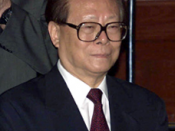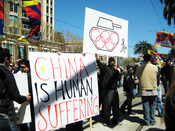China, the US and Taiwan
Of Copyrights and Human Rights
During January and February 1995, the question of copyrights and intellectual property rights was high on the agenda between the US and China. The problem was that rampant Chinese piracy of American computer software, music CDs, videos and movies was costing the American software, music and movie industry billions of dollars annually.
In an attempt to enforce copyrights, the US threatened trade sanctions amounting to some US$ one billion / year against China, and set a February 26th deadline. In the end, the two sides came to an accord, and China reportedly agreed to clamp down on pirate manufacturers of CDs and to start abiding by international copyright agreements. The accord had a price for the US too: according to news reports China insisted that the US support China's application as a founding member of the World Trade Organization.
On 12 March 1995, US Trade Representative Mickey Kantor stated that the US would do so.
The US firmness on the economic front was combined with a new willingness of the Clinton Administration to take China to task on the issue of human rights. In its annual Human Rights report, made public in the beginning of February 1995, the State Department concluded that during the past year there was ``no significant, concrete improvement in China's human rights record.''
In the beginning of March 1995, at the annual meeting of the 53-member UN Human Rights Commission, the US also backed a European draft resolution, which expressed concern at continuing reports of violations and severe restrictions of fundamental freedoms. Regrettably, the resolution was narrowly defeated by a 21-20 vote, after China strenuously lobbied against it.
Taiwan Communiqué comment: While we welcome the renewed attention given by the US to human rights in...


